VOTER GUIDE
 On Tuesday, June 30, Faith in Public Life and Interfaith Power & Light released a voter reflection guide endorsed by prominent national faith groups and religious leaders. The guide, Democracy, Values & the 2020 Election, addresses urgent issues in the election, including voting rights, climate change, systemic racism in the criminal justice system, healthcare and immigration. The guide, which will be distributed across the country for discussion in diverse faith communities, includes topics for reflection and sample questions to ask candidates Download Full Guide Here
On Tuesday, June 30, Faith in Public Life and Interfaith Power & Light released a voter reflection guide endorsed by prominent national faith groups and religious leaders. The guide, Democracy, Values & the 2020 Election, addresses urgent issues in the election, including voting rights, climate change, systemic racism in the criminal justice system, healthcare and immigration. The guide, which will be distributed across the country for discussion in diverse faith communities, includes topics for reflection and sample questions to ask candidates Download Full Guide Here
Download Spanish-language version of the guide, Democracia, Valores y las Elecciones de 2020
Issues and Questions
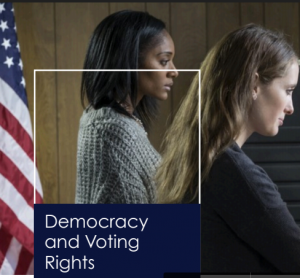 Democracy and Voting Rights (Page 1)
Democracy and Voting Rights (Page 1)
This election is more than a choice between parties and ideologies. An even more fundamental question is at stake: Can we preserve democracy in the face of serious threats to fair elections and fundamental rights?
Questions for Reflection and Candidates
- How do you see democratic values at risk today?
- How do systemic barriers to voting undermine our most sacred democratic values?
- How can your faith community better advocate for stronger voter protections at the state and local level?
- As a candidate, what are your specific plans for protecting and strengthening voting rights?
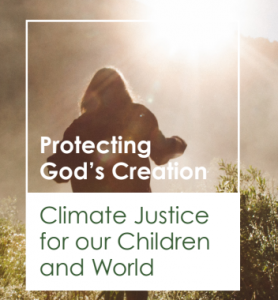 Protecting God’s Creation Climate Justice for our Children and World (Page 2)
Protecting God’s Creation Climate Justice for our Children and World (Page 2)
As people of faith, we believe that responding to the urgent threat of climate change is essential to caring for God’s creation and loving our neighbors. Human activity, primarily the burning of fossil fuels for energy, has thrown
nature out of balance, polluted the air, driven thousands of species of God’s creatures to extinction, intensified catastrophic events such as wildfires and hurricanes, and threatened the lives and livelihoods of our most vulnerable brothers, sisters and neighbors around the world. Scientists tell us we have less than a decade to avoid even more catastrophic consequences.
The United States has a unique responsibility to show moral and political leadership:
- Transitioning our economy away from polluting fossil fuels toward 100% clean energy.
- Honoring the emissions-reduction commitments our nation made at the UN Conference on Climate Change in Paris in 2015, and taking additional actions needed to avert catastrophic global warming.
- Assisting developing nations— who are least responsible for climate change but most impacted by it — in coping with threats such as increased droughts, disease, and sea-level rise by sharing technology and financial support.
Questions for Reflection and Candidates
- What does your faith teach about our responsibilities for the Earth and to others? How are they interdependent?
- Has your faith community made an effort to cut emissions, save energy, or practice environmental stewardship?
- As a candidate, what specific policies do you support to protect God’s Creation and secure a safe climate for our children and future generations?
 Loving Our Immigrant Neighbors (Page 4)
Loving Our Immigrant Neighbors (Page 4)
Scripture repeatedly makes clear that immigrants must be treated with dignity. Policies that rip children from their parents’ arms, lock people away in inhumane conditions, and ban desperate families from entering the country
should keep us awake at night. As people of faith, we believe that the way we treat our immigrant neighbors is a sign of how we treat God.
Questions for Reflection and Candidates
- How can we replace immoral immigration policies that tear families apart and cause trauma with an immigration system that values families and affirms the dignity of allv people?
- What can we do to heal the wounds inflicted on immigrant communities by political rhetoric that portrays them as a dangerous “other?”
- If there are immigrants in our community who are feeling isolated and under threat, how can we show support and build connections?
- As a candidate, what will you do to defend the dignity of all immigrants, and how will you further policies that keep families together?
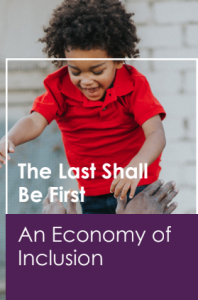 The Last Shall Be First An Economy of Inclusion (Page 5)
The Last Shall Be First An Economy of Inclusion (Page 5)
Our economic systems should work for all Americans, not only the wealthiest few. This is a matter of justice and
human dignity. All religious traditions recognize that charity is essential to care for the most vulnerable, but helping our neighbors in poverty also compels us to address its root causes. “Charity is no substitute for justice withheld,” St. Augustine observed centuries ago.
Questions for Reflection and Candidates
- What can we do to ensure that all Americans are able to provide for their families and live with security and dignity?
- How do we create a just tax system that is fair to all Americans, including working families who are trapped in poverty?
- Why does the United States lag behind most developed countries when it comes to providing paid sick leave and paid family leave?
- As a candidate, what are your specific plans to ensure workers have living wages and economic security while the coronavirus pandemic continues, as well as for the long term?
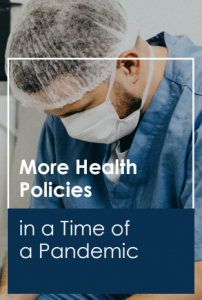 More Health Policies in a Time of a Pandemic (Page 7)
More Health Policies in a Time of a Pandemic (Page 7)
Despite our nation’s stated values of life and equality, the United States is the only industrialized country in the world that does not guarantee its residents universal access to health care. This is a failure of political and moral imagination – especially in a time of pandemic.
Questions for Reflection and Candidates
- How can people of faith be most effective in using our stories, congregations and power to advocate for health care reform?
- What do you struggle with the most when it comes to our healthcare system?
- How has the COVID-19 crisis impacted your community? What policy solutions can keep us all safe and remedy racial and economic inequalities in your community?
- As a candidate, what are your specific plans for making sure that quality,
affordable health care is available for all?
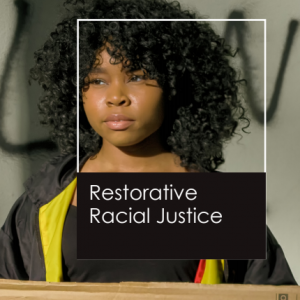 Restorative Racial Justice (Page 9)
Restorative Racial Justice (Page 9)
Justice and redemption are at the very heart of faith. Restorative justice begins with listening to and empowering communities that have been exploited, excluded and denied equal representation and freedom. The evil ideology of
white supremacy shaped our nation from its founding and continues to impact policies and communities today, especially in the criminal justice system. The killings of Ahmaud Arbery, Breonna Taylor, George Floyd and so many other Black people, Indigenous people, and other people of color, has provoked a growing, multi-racial moral movement for accountability and systemic reforms for racial justice.
Questions for Reflection and Candidates
- How can we dismantle the evil ideology of white supremacy in our culture and political systems?
- What can be done to end racial profiling and police violence against people of color?
- What steps can be taken to ensure formerly incarcerated people have voting rights and fair access to employment?
- As a candidate, what will you do to ensure racial justice is prioritized in the criminal justice system?
- How do we build safe communities for everyone, particularly people of color?
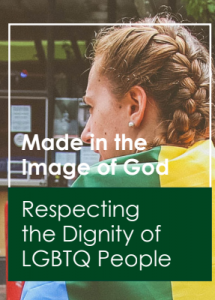 Made in the Image of God: Respecting the Dignity of LGBTQ People (Page 11)
Made in the Image of God: Respecting the Dignity of LGBTQ People (Page 11)
All people have inherent dignity because everyone is created in the image of God. Our gay, lesbian, bisexual and transgender family members, neighbors and co-workers deserve equal rights, and to live without fear or discrimination.
Questions for Reflection and Candidates
- How can your faith community more fully support the equal dignity of LGBTQ people in your state and local area?
- What are the greatest threats to LGBTQ people in your community and the nation?
- As a candidate, what are your specific plans to ensure that LGBTQ people have equal rights and are treated with dignity
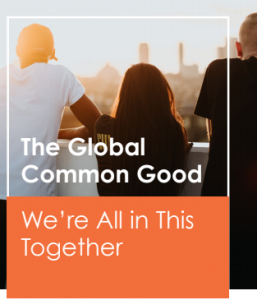 The Global Common Good: We’re All in This Together (Page 12)
The Global Common Good: We’re All in This Together (Page 12)
What does it mean to love our neighbors as ourselves in a globalized world? The health and future of our country and
communities are interconnected to the health and security of other nations. Our fates are bound up in what Rev. Martin Luther King, Jr., called “an inescapable network of mutuality.”
Questions for Reflection and Candidates
- What policies do you think are most important for creating security for your family and community?
- What role should the United States play in the world to help build global peace and security?
- How can your faith community advocate for policies to create a more peaceful world?
- As a candidate, what programs and policies would you prioritize to help build secure communities and a peaceful world?

Please Sign Our Petition in Support of EPA Methane Rules
/in Faithful Citizenship, Featured Articles, NEWS, Permian Basin /by adminPlease join people of faith and conscience in New Mexico in signing a petition to thank the Environmental Protection Agency (EPA) for finalizing a strong rule to cut methane and other harmful pollutants from oil and gas operations. This action protects vulnerable communities in the Permian Basin and the Four Corners.
As people of faith and conscience in New Mexico, are writing to express our gratitude for your leadership in finalizing the rule to cut methane pollution and other harmful air pollutants from the oil and gas sector. This bold action is a critical step toward addressing climate change, protecting public health, and creating new jobs.
These common-sense protections address one of the single largest sources of climate-destabilizing pollution in the U.S. and the world. Methane is 80 times more powerful at warming the climate than carbon dioxide, and over one-third of the warming the world is experiencing today is due to methane emissions from human activities.
View full petition and please add your signature
Read a letter to House Energy and Commerce Committee in support of EPA rules, signed by Kayley Shoup, organizer for Citizens Caring for the Future, and Sister Joan Brown, executive director of Interfaith Power & Light New Mexico,
A Letter to the House Energy and Commerce Committee in Support of EPA Methane Rules
/in Faithful Citizenship, Featured Articles, NEWS, Permian Basin /by adminKayley Shoup, organizer for Citizens Caring for the Future, and Sister Joan Brown, executive director of Interfaith Power & Light New Mexico, penned the following letter to the U.S. House Energy and Commerce Committee, We have added some subheadlines to highlight important points in the letter.
Members of the House Energy and Commerce Committee we write to you to affirm the importance of the Methane Rules in the oil and gas industry and the Methane Emissions Reduction Program. We would be very concerned if these vital safeguards for public health and care for our sacred land, water and air were dismissed. As a frontline community group Citizens Caring for the Future whose members live in the Permian Basin of Southeast New Mexico and as New Mexico and El Paso Interfaith Power and Light which is an organization of people of faith with some members living in the Permian Region and working in solidarity with the frontline communities, we support the proposed rules and thank you for considering our comments.
Health Concerns in Vulnerable Frontline Communities
Those living, working and visiting the Permian Basin, the most productive oilfield in the country, witness firsthand the environmental challenges posed by extensive oil and gas operations. Headaches are common from fumes from oil facilities which number tens of thousands. Living in constant proximity to so much pollution causes cancers, asthma, premature births, and other health problems. The American Lung Association is quite clear in expressing concerns for health in their State of the Air Report where both Eddy and Lea County received an F grade for ozone pollution. In addition emotional stress and even depression especially among young people is growing as a sense of hopelessness settles into communities with increased suicide and violence. Climate change concerns also affect young adults who increasingly know that humans are truly one with the earth and methane pollution is a large contributor to climate change. What hurts the planet, hurts us.
Pollution is an ethical and moral concern that visitors coming to the region through Immersion Retreat experiences that we sponsor immediately note. The assault upon human communities and the sacred land, water and air of New Mexico is a violation that is stark, yet often not spoken about because the economy of the region and state is so dependent upon the oil and gas industry. While Southeast New Mexico may be an economic driver for the state through the oil and gas industry, it is also home to the Carlsbad Caverns National Park and a Cave & Karst ecosystem. A new National Park Service (NPS) report shows that there were 349,244 visitors to Carlsbad Caverns National Park in 2021 and they spent $25.1 million in communities near the park. That spending supported 312 jobs in the local area and had a cumulative benefit to the local economy of $27.4 million. Not only does oil and gas threaten the health of these underground worlds of biodiversity that are crucial to scientific research, but it also has an impact on the other diverse drivers of the local economy like tourism.
EPA methane rules a significant step
For these reasons, the recent EPA methane rules are a beacon of hope because they signal a crucial step towards mitigating the harmful effects of methane emissions and harmful VOC emissions in our region. By imposing stricter regulations these rules not only protect our air quality but also contribute to addressing the global climate crisis. As people deeply committed to preserving the natural beauty of the Permian Basin and the viability of our planet we believe that the EPA’s actions provide a foundation for fostering positive change. But, these regulations must be enforced if we are to see a change. Sadly, the Permian Basin should be designated a non- attainment zone by the EPA based on high ozone levels that are being recorded by the National Parks Service and scientists such as Dr. Detlev Helmig with Boulder AIR. In a period of just six months the Boulder AIR air monitor has recorded “31 days in which ground-level ozone levels surpassed the Environmental Protection Agency’s eight-hour National Ambient Air Quality Standard of 70 parts per billion.”
While New Mexico does have methane pollution rules that the state is making progress in enforcing, the Southeast region suffers from poor air quality coming from Texas, which has no state methane rules. In New Mexico overall 53% of people of color or approximately 80,000 people live within a half mile of oil and gas wells. While the Permian Basin does not have a large Native American population, overall in the state 17.1% (26,000) live within a half-mile of oil and gas facilities while proportionally they make up 10.5% of the total population. Adding to these facts, New Mexico ranks third in the nation with the highest poverty rate, making these environmental justice concerns. The Oil & Gas Threat Map map offers these realities to our communities, especially children in great detail. Another helpful resource that offers scientifically determined data and the effects on communities can be found through the Environmental Defense Fund.
Permian Basin an important precedent
If we are to truly cut methane emissions in the United States we must address what is happening in the Permian and in New Mexico overall. We do that by following the mandates of the Clean Air Act, enforcing strong EPA regulations, and by implementing a managed decline of oil & gas production.
The Permian Basin faces the dilemma of balancing economic interests with environmental responsibility. The EPA’s methane rules strike a necessary balance by incentivizing the adoption of advanced technologies and practices to reduce methane emissions. This not only benefits the environment but also presents an opportunity for the region to transition into other jobs for workers, such as retrofitting equipment, methane mitigation jobs and clean-up. Transition is only possible if we also have the opportunity to conserve our air, water and land instead of being treated like a disposable sacrifice zone. We are encouraged by the potential for these rules to stimulate innovation, create green jobs, and ultimately pave the way for a cleaner, more sustainable future.
These rules empower frontline communities to engage with local communities, industry stakeholders, and policymakers to ensure that these regulations are effectively implemented and lead to meaningful change and a healthier world. The spirit of collaboration and dialogue that they invoke, enables us to work towards a common goal of safeguarding the environment while promoting a just and sustainable future for the Permian Basin and the planet. We must work together as we face the climate crisis.
Sincerely,
Kayley Shoup, Organizer, Citizens Caring for the Future
Sr. Joan Brown, osf, Executive Director New Mexico & El Paso Interfaith Power and Light
Join us for an Advocacy Briefing on Tuesday!
/in Faithful Citizenship, Featured Articles, NEWS, NM Legislature /by adminThe briefing will be held on Zoom on January 9, 5:30 p.m.
Find out how you can support and help pass legislation that ensures that our state properly prepares for the future by funding important measures that protect our sacred air, land, water, and public health.
Please Register Here